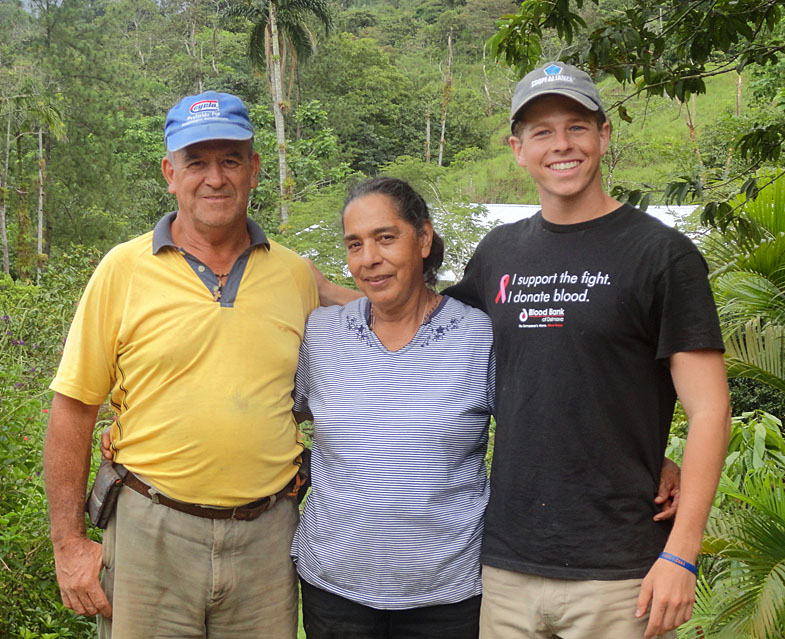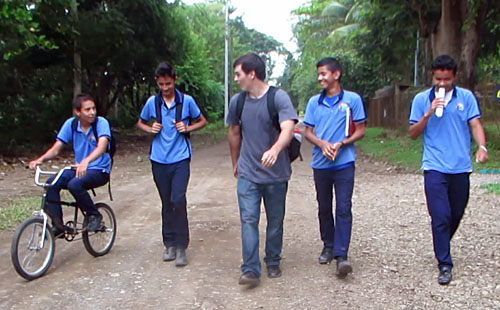“In addition to everything I learned about water management, I now have a second family in Pejivalle,” wrote Colorado College student Matt Nadel. “From the second that my dad picked me up from the bus stop on my first day, I was immediately welcomed into the family.”
Nadel was describing his rural community practicum experience on ACM’s fall semester program in Costa Rica, when students pack their bags and leave the familiar urban setting of San José to spend a month in small villages and towns in the countryside.
Based on what Nadel and his classmates have to say, it’s clear the experience was intense – and intensely satisfying – as they adapted to new surroundings, relied on their Spanish language skills, and engaged in projects related to education, public health, and the environment.
 Matt Nadel with his host family in Pejivalle. (Photo courtesy of Matt Nadel)
Matt Nadel with his host family in Pejivalle. (Photo courtesy of Matt Nadel)
The rural stay has long been a highlight of the Costa Rica: Community Engagement in Public Health, Education, and the Environment program. This year, ACM staff adjusted the schedule so the experience is now a full month, which has deepened the students’ cultural immersion as they live with a host family away from their fellow program participants.
During the month, each student completes a structured practicum project related to one of the program’s three areas of focus, which integrates the rural experience with the students’ academic work and connects with their interests.
For example, St. Olaf College student Reilly Quirk, a Spanish education major, aided the single teacher in a one-room elementary school in the tiny mountain town of El Silencio. The month gave her “a new perspective as an upcoming teacher,” she wrote, and “has made such an impact on me personally that I have rethought how I want to live out my life.”
 The fall 2013 Costa Rica group visiting Cartago. (Photo courtesy of Reilly Quirk)
The fall 2013 Costa Rica group visiting Cartago. (Photo courtesy of Reilly Quirk)
About half of the students who participated in the fall 2013 program worked in schools, doing everything from tutoring to giving lessons about animals and biology to teaching dance steps.
“I was able to get creative and truly utilize what I have learned in my educational endeavors,” said Carli Alvarado, who is a Primary Education major at Monmouth College. Her practicum at a school in Quebrada Ganado gave her the opportunity to take the lead in planning and teaching lessons to small groups of students ranging from first to fifth grade.
“There was something exceptionally authentic, beautiful, and profound about bonding with such small groups of children while listening to their thoughts and trying to help them get past their hesitations and doubts,” she noted. “Also, the fact that I got to actually work in a school in another country has enabled me to understand some of the more systemic problems with educational systems in a global sense.”
| “A highlight from my time there was when my host father and I went fishing. I have fishing experience and even taught a class on fishing, but this was something completely different.” | |||
| “I was doubly blessed to spend one precious month in a community so close, supportive, and dynamic.” | |||
| “I experienced a different perspective of how indigenous people truly live instead of our perceptions of them.” |
For Brenna Banwarth-Kuhn, a biology major at Emory University, her practicum at a small clinic provided insights into Costa Rica’s socialized health care system and chances to observe the medical team in all aspects of their daily work. “As a student who is interested in studying public health and later continuing on to medical school,” she wrote, “this month was an invaluable experience.”
Ilana Mishkin and Katie Richards, both from Carleton College, assisted with a biological research project, collecting data on the behavior and habitat of two-toed baby sloths that lived in the forests of a cacao plantation. Richards also taught an English conversation course to a group of women at a local chocolate cooperative, to help them communicate with English-speaking tourists who visit the area.
Colorado College math major Zach Steedman pursued his practicum project in a high school, where he tutored students, led math review classes, and even stepped in as a substitute teacher.
He created a “day in the life” video about his experience in the seaside fishing village of Tárcoles, and returned at the end of the semester to say goodbye to his rural host family and attend a going away party at the high school.
 Zach Steedman with some of his students in Tárcoles. (Photo courtesy of Zach Steedman)
Zach Steedman with some of his students in Tárcoles. (Photo courtesy of Zach Steedman)
In his reflection, Matt Nadel highlighted the importance of both the personal relationships and the practicum project. “The experiences that I had with my family and academic projects in Pejivalle have changed my outlook on what I want to study and what I want with my future,” he wrote. “I could not have asked for a community engagement experience that was more interesting, interactive, and worth my time.”
The program’s webpage has more of what the students wrote about their rural community practicum experiences this past fall, along with links to student blogs from Costa Rica.
Links:
- Costa Rica: Community Engagement in Public Health, Education, & the Environment
- Students’ reflections on their rural community practicum experience
- Read student blogs about the Costa Rica Program









